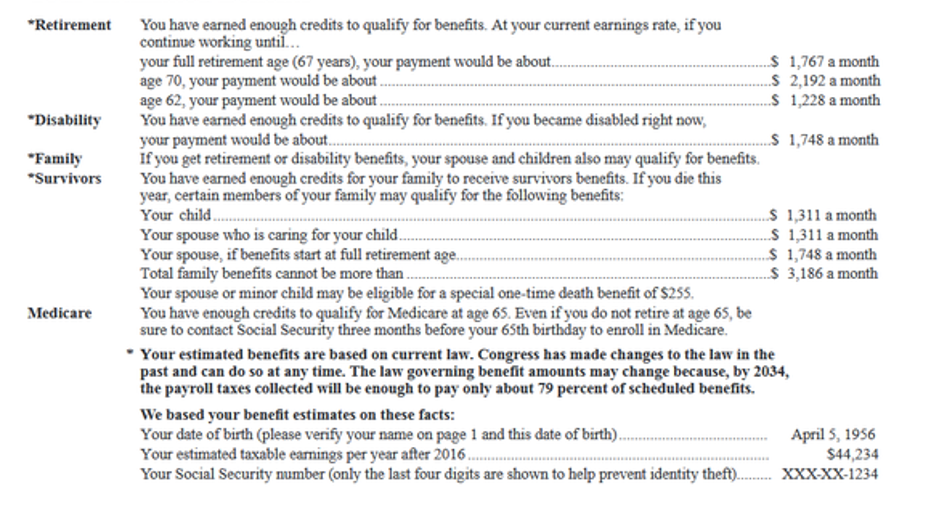7 Reasons You Need to Read Your Social Security Statement

If you're relatively young, Social Security may be the furthest thing from your mind. However, the Social Security Administration issues you a statement every year, and it's definitely in your best interest to take a look. In addition to information about your eventual retirement benefits, there are several pieces of valuable information you can find on your statement.
Image source: Social Security Administration.
1. An estimate of your retirement benefits
Most obviously, your Social Security statement provides an estimate of your retirement benefits based on your work record. Keep in mind that this estimate makes certain assumptions, particularly that your earnings in 2016 and beyond will stay about the same as your 2014 and 2015 earnings. It does not take into account estimated inflation between now and when you retire. Naturally, this estimate will be more accurate as you get closer to retirement, but it's still useful for retirement-planning purposes earlier in your career.
2. The effects of early or late retirement
Your Social Security statement also shows how much you can expect per month if you retire at age 62 or age 70, the earliest and latest possible ages. To estimate your benefit for any other retirement age, here's what you need to know.
3. Have you earned enough credits?
As you can see from the image above, the first sentence under the heading "your estimated benefits" will let you know if you've earned enough credits to qualify for retirement benefits. For 2016, you earn one credit for every $1,260 of wage or self-employment income, up to four per year. Once you've earned 40 credits, or 10 years with $5,040 or more in earnings, you qualify for Social Security retirement.
4. What if you become disabled?
If you become disabled, your eligibility for and amount of Social Security disability insurance depends on your work record. Your Social Security statement can tell you whether you've earned enough credits to qualify (depends on your age), and how much you could expect to receive if you were to become disabled right now.
5. What if you die before retirement?
In addition to retirement and disability benefits, Social Security can also provide income to your loved ones if you die. Survivors' benefits are available to your spouse, children, and certain other dependents, and your statement can tell you how much these individuals could expect to receive if you were to die this year.
6. Medicare information
Your Social Security statement tells you whether or not you've earned enough credits to qualify for Medicare once you turn 65. There are also instructions that can help you apply.
7. Verify your work record
On the page after your benefit estimates, you'll find a copy of your work record, broken down by year. This is the amount of income on which you paid Social Security and Medicare taxes. While you don't necessarily need to do this each year, it's a good idea to review your earnings record the first time you check your statement, in order to verify its accuracy. If any of your previous years' earnings are stated incorrectly, contact the Social Security Administration. If you have your W-2(s) or tax return(s) for inaccurate years, it will help move the process along.
How to get your Social Security statement
There are a few ways you can get your Social Security statement.
- Do nothing. The SSA mails statements to workers attaining ages 25, 30, 35, 40, 45, 50, 55, and 60 or older three months prior to their birthdays, if they're not yet receiving Social Security benefits and have not created a "my Social Security" account online.
- Create an account online at www.ssa.gov. Doing so allows you to access your annual Social Security statements whenever you want. Be aware that once you make an account, the SSA will no longer mail you statements.
- If you don't have an online account, and don't want to wait for several years to get your Social Security statement, you can request one by mail by completing a form and mailing it to the SSA.
The bottom line is that your Social Security statement contains valuable information that matters to Americans of all ages -- not just retirees. So take the time to look over yours to see where you stand.
The article 7 Reasons You Need to Read Your Social Security Statement originally appeared on Fool.com.
Try any of our Foolish newsletter services free for 30 days. We Fools may not all hold the same opinions, but we all believe that considering a diverse range of insights makes us better investors. The Motley Fool has a disclosure policy.
Copyright 1995 - 2016 The Motley Fool, LLC. All rights reserved. The Motley Fool has a disclosure policy.



















